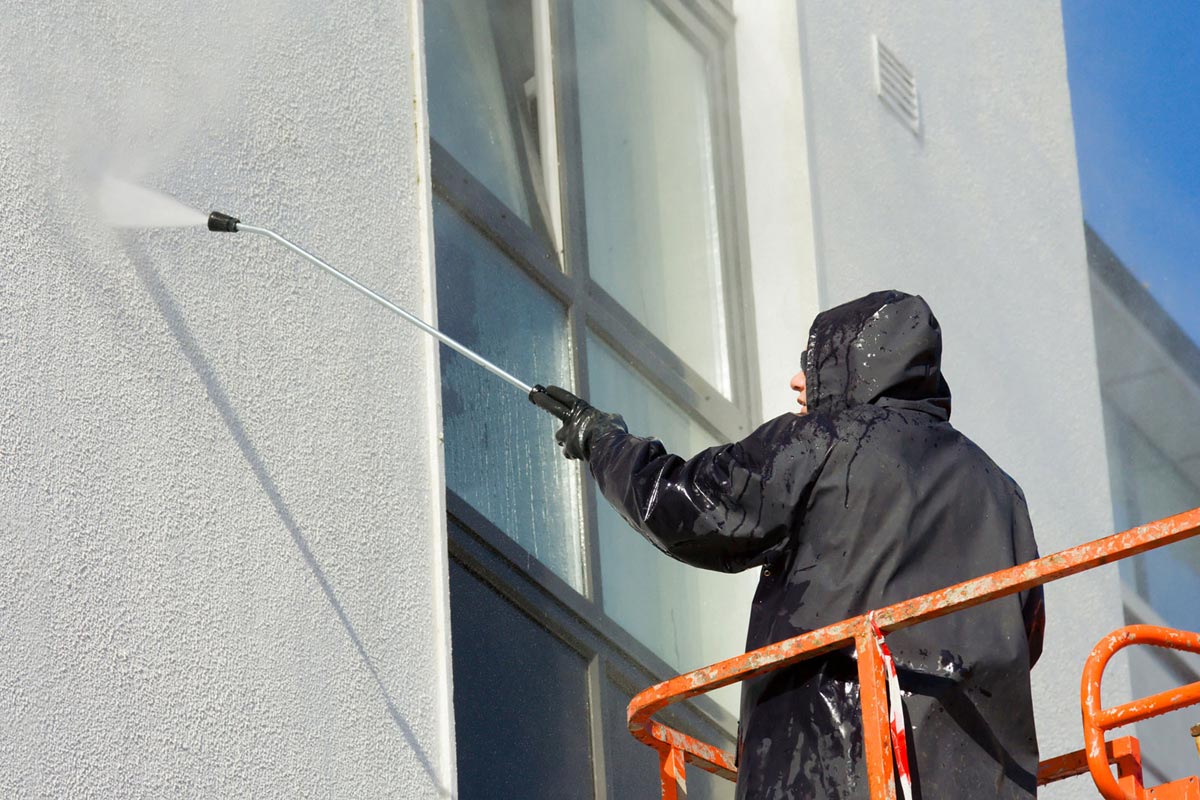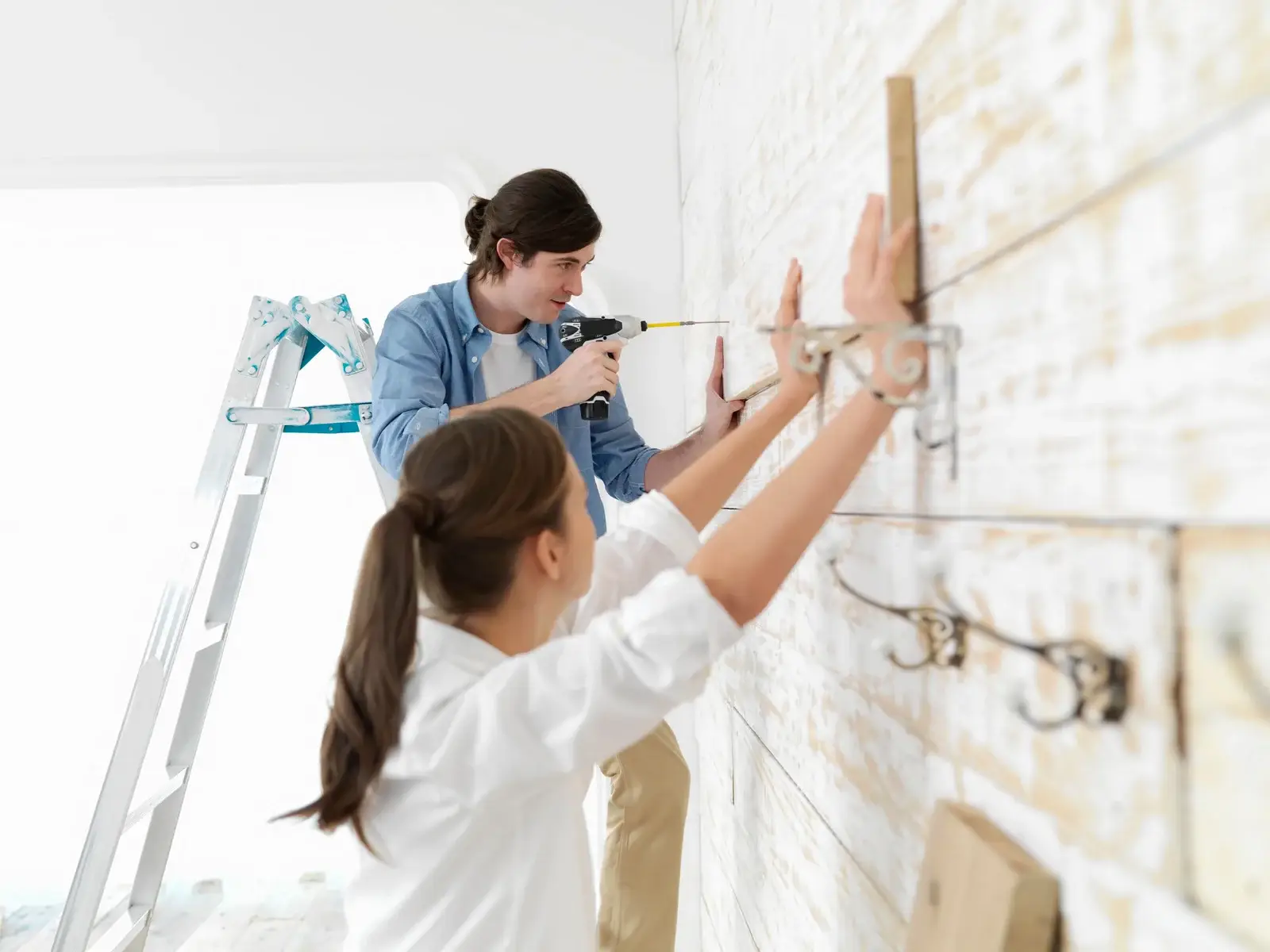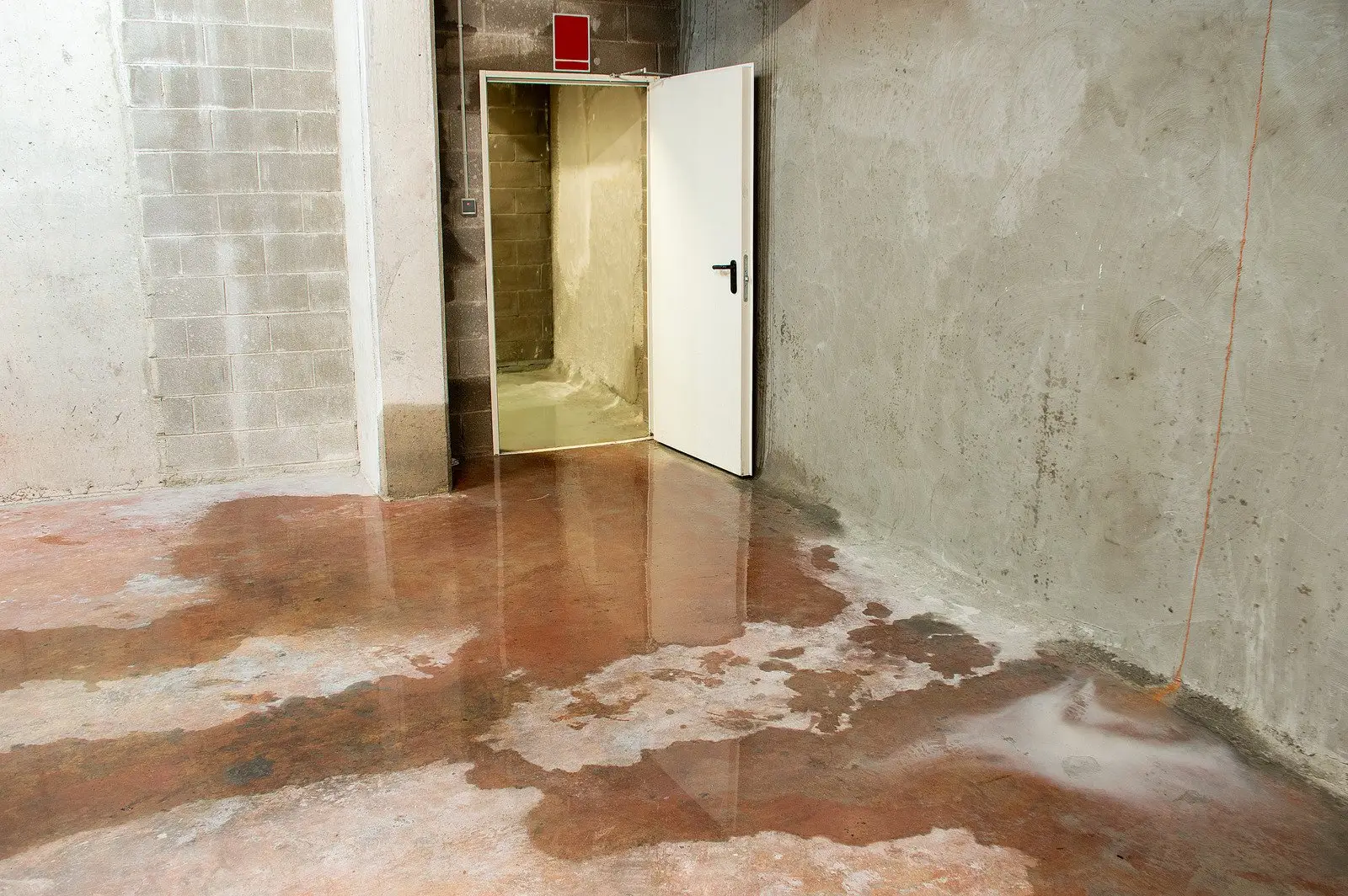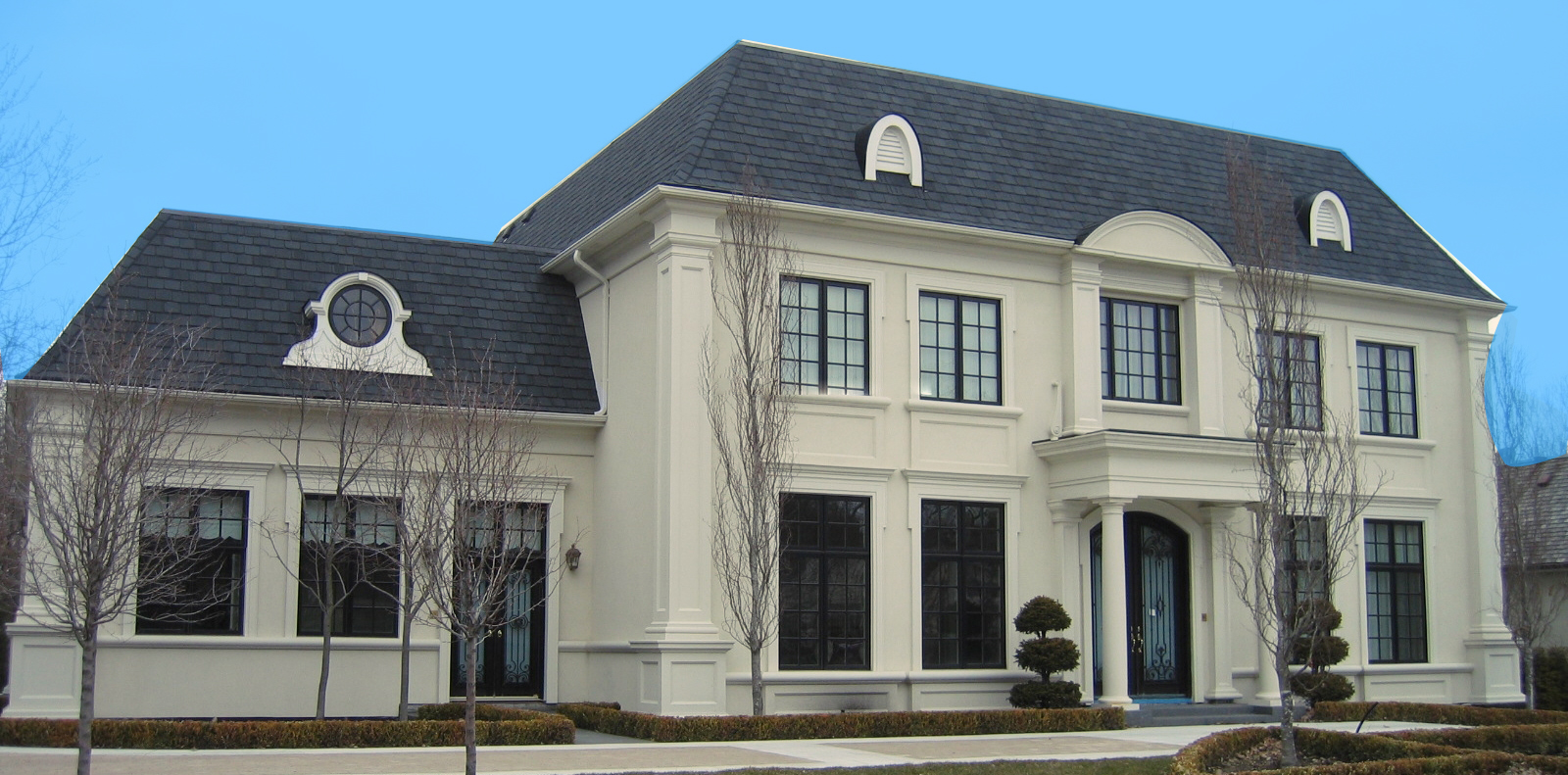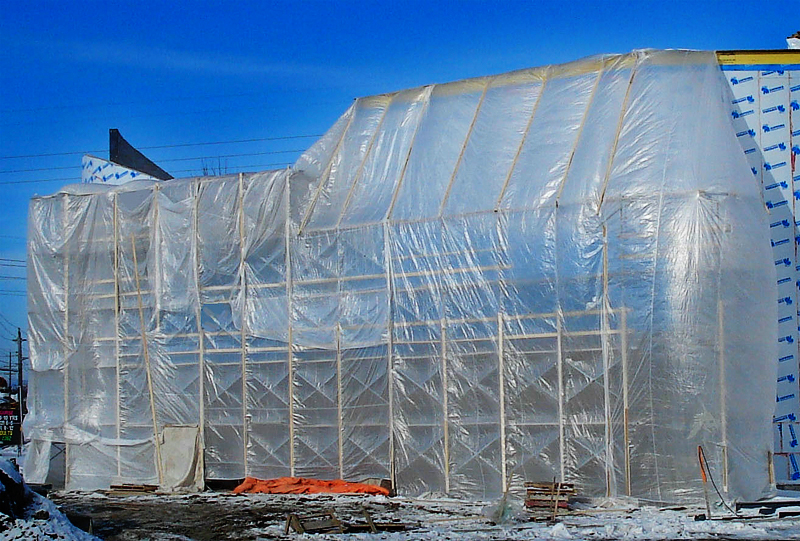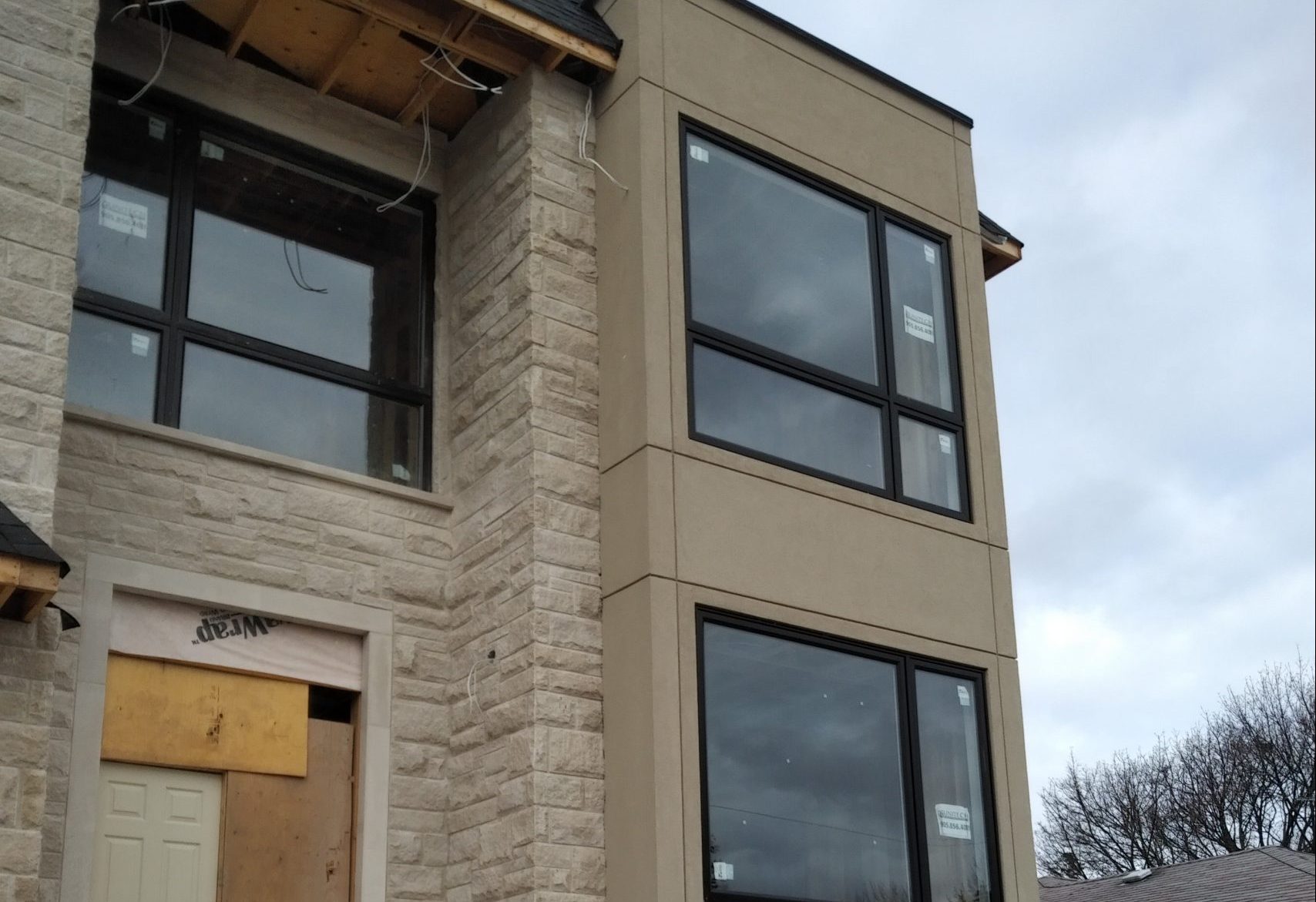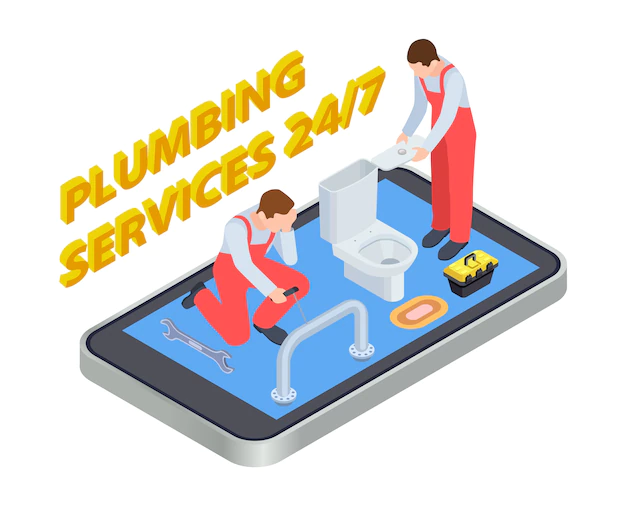There is a lot of questions about stucco maintenance and a lot of these are pretty legitimate but isn’t stucco supposed to be virtually maintenance-free? Stucco is more of a maintenance-free finish it does require a little attention every now and then, just like everything!
The maintenance is very minimal though, providing that you have sound stucco walls that were applied correctly. It is pretty easy to maintain though and you might be surprised at just how easy it is to maintain.
Washing Your Stucco Walls:
Stucco walls can be washed and should be washed two to three times a year in order to maintain the finish coat’s ability to shine awnd function the way it should. You can do this one of two different ways: using a garden hose or a pressure washer.
Using A Garden Hose: You can use a simple garden hose and wash down the exterior of your stucco but be aware that this will only remove a small amount of the dirt and debris that gets collected on your stucco walls over time.
Using a garden hose works best on smooth to semi-smooth textures and will provide a decent cleanse, removing the debris that is loose on the surface.
If you want to get a much better result from using your garden hose then use a medium stiffness brush to get the majority of the dirt removed. This is a lot more labor intense but will have very different results for your efforts as well.
Helpful Tip: Whenever wetting down stucco walls, manufacturers will recommend starting at the bottom and working your way up for the first initial “wetting down the wall”.
This prevents any staining from occurring that could potentially happen by starting at the top, especially with traditional stucco finishes that tend to absorb water.
Some brushes have a threaded hole on them somewhere where you can attach an extension wand to make the job easier by extending your reach.
If you look on Amazon, you will find many deck scrub brushes that work well for this and are wide as well, cutting the required time it takes to get the job done down quite a bit.
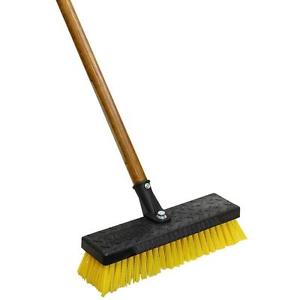
Using A Pressure Washer: A pressure washer is the preferred way to clean your stucco because it is much faster, less labor intense and does a better job than a garden hose would. If you want to clean your stucco then you will need a pressure washer that is capable of around 1500 psi MINIMUM.
Always use caution when using a pressure washer and wear appropriate safety gear to prevent injury (eye protection, hearing protection, etc.)
Remember that a minimum recommendation will get the job done but a pressure washer that has 2,800 psi will also do the job, a little faster and a little better because of the added psi. So I recommend a unit around 1,500 – 2,800 psi.
You will want to use a 40 degree nozzle when cleaning the stucco and always be mindful of the distance your nozzle is from the wall and watch the stucco for any damage that may occur from pressure washing. A good distance to maintain is 12″ – 24″ from the nozzle to the wall for cleaning using a 40 degree tip.
Feel free to experiment with the distance and if you want to try a more concentrated nozzle (25 degrees) then be sure you have the nozzle further away to avoid damaging the stucco finish.
Helpful Tip: The closer your nozzle is to the wall, the better the cleaning power but you will be cleaning less surface area at once.
When your nozzle is farther away from the wall you will get more surface area cleaned at one time but it will not be as aggressive at cleaning the wall.
Using Cleaning Agents On Your Stucco:
You can also use specific cleaners to help remove tougher stains like dirt, mildew, mold and other problematic materials that can cause staining on your walls.
There are many different cleaners out there to choose from but I will keep the list short to avoid confusion and keep the process as simple as possible.
Plain Dish Soap And Warm Water: You can use warm water and a good quality dish soap to do a general cleaning of mild dust and debris on your stucco walls and using a good soap (I like Dawn) will give you more cleaning power than just water alone.
Bleach And Water Solution: Bleach can be a great cleaner to use on mold and mildew stains on your stucco walls but be wary of nearby plants, trees or anything else that might be at risk from using bleach.
You can add 1 part bleach to 10 – 20 parts water for a more general type of cleaning on the walls or you can strengthen the mix to 1 part bleach and 5 -10 parts water for tougher stains and “spot treatments”.
Helpful Tip: Always test a small area of your stucco before using bleach in an inconspicuous area of your house or building to see how it reacts and if it harms the color in any way.
Stucco Cleaners From Stucco Manufacturers: There are a few manufactures that have stucco cleaners available and these usually come in the form of a spray bottle that you hook a garden hose up to, making it easy to use and pretty effective too.
The image on the right shows a stucco cleaner from the stucco manufacturer Omega and as you can see, the smaller bottle gets hooked up to a garden hose and you directly spray it onto the wall.
The larger container (gallon) is used to refill the smaller jug (32 oz.) which is good for approximately 1,000 sq. feet of wall.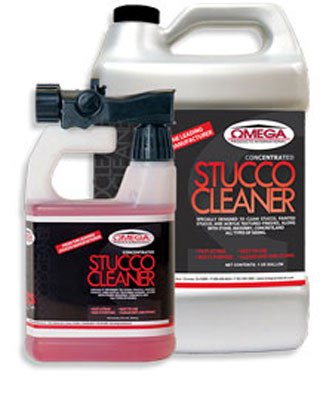
omega-products.com
TSP Solution: TSP is a great chemical that is used for many cleaning tasks, especially when prepping walls for paint and it can work great for cleaning stucco as well.
A good recipe for using TSP is 1 – 2 cups of TSP to 1 gallon of water. If the water is warm, it will work better and help to break down the dirt and debris a little better too. Be sure to pre-soak the wall first, from the bottom, working your way up the wall.
Helpful Tip: Start further away from the wall when pressure washing and move closer to get an ideal distance and maintain the distance that works best.
Maintaining Your Stucco Color:
Stucco color can fade over time and sometimes it can even become stained or discolored in extreme cases. There are a few different things you can do to prevent these things from happening and things you can do to remedy staining issues, blotchy coloring, faded coloring, etc. as well.
Preserving Your Stucco Color:
- Regular cleaning is key to maintaining your color over the years and it helps to eliminate the accumulation of dirt that builds up and can eventually stain (especially lighter colors) the stucco.
- Landscaping is very important to have around your home or some type of barrier between the bare dirt and your stucco wall.
Water that hits the ground and splashes up can ruin the bottom edge of the stucco very quickly and will likely stain the wall within a matter of weeks and sometimes even days. - If your stucco is painted then you will have to schedule to have the house repainted every 3 – 7 years (on average) and keep avoid letting it go too long.
- If you have a traditional stucco finish that is unpainted then you may want to consider having it fog coated to restore the luster of the original stucco color and to make it look like new again.
Stucco Cracks Are Part Of Maintenance…
Stucco is going to crack, it is just the nature of the material but you can fix most of these with a little bit of patience and know-how. Most of the smaller cracks can be fixed using a little caulking and is something most people can do themselves.
Many of the cracks that form are hairline cracks and I have a more in-depth tutorial on how to fix hairline cracks in stucco that shows you how to go about the process.
Applying Caulking Where It’s Needed:
Applying caulking at specific locations where the stucco meets woo or another material is part of maintenance on your home and I think it should fall under stucco maintenance.
Anytime the stucco meets another material, you will have to apply a bead of caulk because the two different materials expand and contract at different rates, which can cause a gap or crack to form. Caulking will bridge this gap and flex with any type of movement preventing issues from potentially happening.
These areas should be inspected annually and you should reapply any caulking when necessary (usually 3 – 5 years on average). An acrylic caulking will blend in best (if done properly) but a silicone or polyurethane caulking will work better and last longer but is difficult to work with.
Stucco Maintenance Cost:
There are minor things that should be done and a lot of them are very low cost and sometimes even free, depending on what you have on hand in and around your home.
On walls that are in very good condition, you may only need warm water, dish soap and a scrub brush, which most people have at their disposal and if not, it would only cost you $20 or less, in most cases.
Other items include caulking and cleaning agents which are very inexpensive too so in general, stucco maintenance is very inexpensive if you tackle it yourself.
The only way you may run into more costly tasks regarding maintenance is if you have neglected your home for a while making a larger amount of work, if you have repair work that needs to be done as well or you hire someone to do the work for you which isn’t that bad considering the value of your home and what you are getting for the money.
Traditional Finishes VS Acrylic Finishes:
Coming Soon! No, its here already!
Common Problems That Can Arise:
In the process of cleaning your stucco walls, there can be a couple of problems that can arise so I wanted to briefly touch on these so you know what to expect and what to look out for.
Finish Chipping Off: Sometimes when you are in the process of cleaning your stucco, the finish can come off in some spots. You can’t always prevent this and it is more of an aesthetic problem (in most cases). This is more likely to happen when pressure washing.
Fixing this can be done but you will need to know what type of finish material you have on your home (traditional or acrylic) and what type of texture. You will also have to get a custom color match with the correct finish material or paint if you want it to blend in as close as possible.
Stucco Color Is Faded Or Discolored: When your color becomes faded or discolored it is easy to remedy but more work that you might think (in some cases).
You can apply a fog coat to tradition stucco finishes (unpainted) or paint to get rid of the discoloration or fading (after cleaning the area well) but color matching is hard and “spot coloring” areas will still be noticeable.
In order to get the entire wall to look consistent, it is recommended that you color the entire wall (from corner to corner). A lot of work, especially if you have a larger wall that the color issues are on.
Stucco Has Larger Cracks: Larger cracks (larger than 1/8″ wide) will require a bit more attention and sometimes can be a sign of a more serious problem (1/4″ and larger). These are better left to have someone come out and look at what’s going on to give you an idea of what to expect.
More often then not, stucco contractors will come out to give free estimates and if you find one that is willing to discuss the problem with you, giving a little insight on what might be causing the issue and how serious it is.
Staining Along Bottom Of Walls: Staining along the bottom of your walls is usually caused by rain falling and hitting the dirt on the ground and splashing up onto the wall.
You can prevent this by having a barrier of rock, mulch, straw or some other type of material that covers the soil. This is the best way to prevent this from happening in the future.
If the staining has already occurred then you will need to put in a pretty decent amount of effort to remove or fade the staining, especially if it has been accumulating over a few months.
A pressure washer is recommended for these types of tough stains and a 25 degree nozzle at a distance of 8 – 12 inches is going to be my starting point. Go as close as you can to the wall without removing any of the finish but use caution and go slow.
Some Other Helpful Tips On Cleaning Stucco:
- Work on one wall at a time from corner to corner in order to get the best possible results. This will ensure that you get every wall as clean as possible and will help prevent the walls from drying too quickly, which could be counter-productive.
- If you have a large house, you can break it up into sections to make the process less labor intense. Try to break the process up into two – four days if you need to, working one side of the hose at a time.
- Remember to pre-soak any stucco walls before doing any cleaning. This will help to reduce any staining that can occur if you are cleaning surrounding areas that run down the wall.
- Different textures will hold different amounts of dirt and the rougher the texture, the more dirt you will have built up on your walls. More frequent cleaning will be required to maintain a clean looking exterior if you have a rougher texture.
- Traditional stucco finishes will soak up water (even dirty water) and will be more prone to staining and discoloration when compared to an acrylic type of texture.

